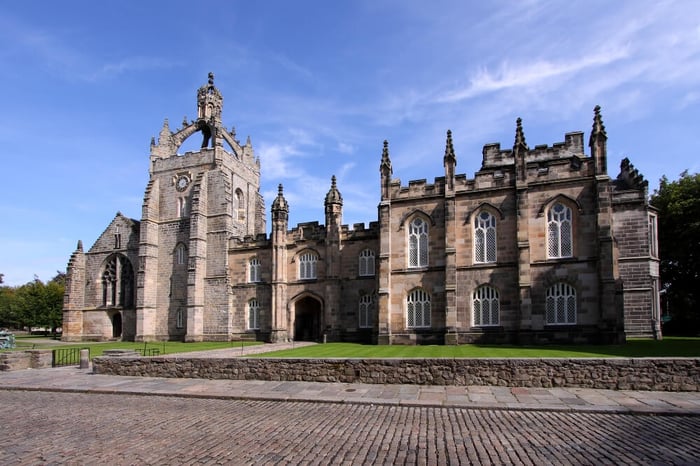
The Definitive Guide to Medical Schools in Scotland
Scotland has many treasures including its beautiful architecture, profound history and high-quality education institutes. With some of the oldest and most reputable universities in the world, it is no surprise that Scottish medical schools can have a high number of prospective applications. Therefore, this article is your comprehensive guide to all the medical schools in Scotland, including their course structure and admission requirements.

Disclaimer: All the information below was verified via the university website in the second week of November 2018 and is predominantly related to the undergraduate courses. Please note that the course structure and admission requirements are subject to change. You are advised to confirm before applying.
University of Aberdeen
Aberdeen's school of medicine is collocated on one of the largest clinical sites in Europe with high-quality teaching and extensive research facilities. Their dynamic 5-year course is delivered using a systems-based, integrated approach, with a key emphasis on student feedback and participation.
Course structure
- Year 1 and 2: the two years provides students with the knowledge of body systems and disease processes that underpin medicine. They also experience weekly clinical attachments working alongside and shadowing members of the multidisciplinary hospital team.
- Year 3: in the third year, the study of the organ systems is completed with a unique opportunity to study medical humanities for a term.
- Year 4: medical students undertake nine 5-week clinical blocks in many different clinical areas and disciplines.
- Year 5: the fifth year comprises of specialist medical, surgical and GP/Psychiatry attachments.
Students have the option to intercalate after Year 3 or Year 4 with a BSc degree in Medical Sciences or Medical Humanities.
University of Dundee
Placed at Ninewells Hospital, Dundee medical school has been the centre of pioneering research in cancer, surgery, drug development, and medical education. Dundee allows students to study medicine in a friendly, responsive and student-centred environment. Their comparatively smaller cohort size means that there is a close integration of teaching activities. Medical students are fully involved from an early stage in pioneering new approaches to clinical practice and research.
Course structure
- Year 1 to 3: The course “Systems in Practice” runs from the beginning of Year 1 until the end of Year 3. It is based on the various organ systems of the body and has integrated modules focusing on clinical sciences, and hospital and community perspectives.
- Year 4 and 5: Fourth and fifth-year focus on series of core clinical placements.
Some students will have the option to intercalate between Years 3 and 4 in a range of courses including: anatomy, cardiovascular medicine, forensic medicine and international health.
University of Edinburgh
Edinburgh Medical School is one of two schools at the College of Medicine and Veterinary Medicine and is internationally renowned for both its teaching and research. Established in 1726, it is one of the oldest universities in the world and is consistently ranked one of the top 50 universities globally.
Course structure
The six-year degree programme is designed to prepare students for the contemporary challenges of medical practice. Medical students taught through a combination of lectures, tutorials, problem-based learning, laboratory work and clinical placements.
- Years 1 and 2: the first two years of the course covers biomedical sciences such as anatomy, physiology, pharmacology, pathology and microbiology, along with social and ethical aspects of clinical practice.
- Year 3: In the third year, medical students begin an intercalated research-based degree. The programmes on offer include biochemistry, neuroscience, pharmacology and psychology.
- Year 4: students will study all aspects of clinical medicine and healthcare and develop practical experience through placements in hospital and general practices.
- Year 5: fifth year includes experiencing a number of medical specialities and completing a research project in partnership with a clinical tutor.
- Year 6: the final year focuses on developing practical skills and knowledge of general and emergency medicine.

University of Glasgow
Glasgow medical school is one of the largest in the UK. Ranked second in The UK Times University League Table 2018, the institute is friendly, supportive and stimulating academic environment. Students gain experience in clinical environments throughout the West of Scotland, including the Queen Elizabeth University Hospital, which has a purpose-built teaching laboratory and a state-of-the-art clinical skills suite.
Glasgow medical school is one of the largest in the UK. Ranked second in The UK Times University League Table 2018, the institute is friendly, supportive and stimulating academic environment. Students gain experience in clinical environments throughout the West of Scotland, including the Queen Elizabeth University Hospital, which has a purpose-built teaching laboratory and a state-of-the-art clinical skills suite.
Course structure
The curriculum is delivered through a range of teaching styles, which include small-group teaching, problem-based learning, lectures and clinical studies.
- Year 1 and 2: The first two years of the course focuses on a system-by-system programme that covers the physiology of major clinical systems. It also includes sessions of professional studies, communication skills and clinical skills.
- Year 3 to 5: the course teaching is structured around 5-10-week clinical attachments, with students rotating through medical and surgical specialities.
The Glasgow School of Medicine offers a one-year intercalated BSc degree, with over 20 options, which can be undertaken between years 3 and 4.
University of St Andrews
Medical students at St Andrews have a unique opportunity to graduate after three years from St Andrews with a BSc Honours degree in Medicine before moving on to a partner medical school to complete their clinical training as a doctor. Their associate medical schools include: University of Aberdeen, Dundee, Edinburgh, Glasgow, Manchester and Queen Mary University of London.
Course structure
The School of Medicine at St Andrews offers an integrated curriculum with a strong clinical context. The six-year course is designed to encourage the application of sciences to clinical problems. Clinical teaching is integrated with basic science learning and spans from first year to third year, running throughout the entire course.
- Year 1: the first year of the course explores preclinical sciences, with modules providing an understanding into the body systems and mechanisms of disease
- Year 2: The second year focuses in detail upon the normal function and dysfunction of specific physiological systems, building upon the material delivered in first year.
- Year 3: The third year is divided into 3 terms. The first term focuses on complex physiological systems. The second term focuses on a significant student-selected research project, and lastly the third term focuses on developing clinical skills.
Medical Schools in Scotland – entrance requirements
Medical schools in Scotland – GCSE requirements
|
Medical School
|
GCSE requirement
|
Source of Information and Date Checked
|
|
University of Aberdeen
|
A minimum grade 5 in English and Maths
|
University website on 14/11/18
|
|
University of Dundee
|
A minimum grade B (grade 6 in a numerical scale) in English, Mathematics
|
University website on 15/11/18
|
|
University of Edinburgh
|
A minimum grade B (grade 6 in a numerical scale) in English, Biology, Chemistry and Mathematics
|
University website on 14/11/18
|
|
University of Glasgow
|
A minimum grade B (grade 6 in a numerical scale) in English
|
University website on 15/11/18
|
|
University of St Andrews
|
Minimum of five A grades (grade 7 in the numerical scale)
|
University website on 14/11/18
|
Medical schools in Scotland – A-level requirements
|
Medical School
|
A-level Requirement
|
Subjects Required
|
Source of Information and Date checked
|
|
University of Aberdeen
|
AAA
|
Chemistry and one other from Biology, Physics or Mathematics
|
University website on 14/11/18
|
|
University of Dundee
|
ABB (minimum)
AAA (typical)
|
Chemistry and one other from Biology, Physics or Mathematics
|
University website on 15/11/18
|
|
University of Edinburgh
|
AAA
|
Chemistry and one other from Biology, Physics or Mathematics (But biology preferred)
|
University website on 14/11/18
|
|
University of Glasgow
|
AAA
|
Chemistry and one other from Biology, Physics or Mathematics
|
University website on 15/11/18
|
|
University of St Andrews
|
AAA
|
Chemistry and one other from Biology, Physics or Mathematics
|
University website on 14/11/18
|
Medical schools in Scotland – Admission tests
|
Medical School
|
Admission Exam
|
How is it Used?
|
Source of Information and Date checked
|
|
University of Aberdeen
|
UCAT
|
A minimum UCAT cut-off score is not used. For 2018, the lowest total score for an applicant invited to interview was 2380 and the highest was 3150
|
University website on 14/11/18
|
|
University of Dundee
|
UCAT
|
There is no minimum cut-off score
|
University website on 15/11/18
|
|
University of Edinburgh
|
UCAT
|
There is no minimum requirement. Applicants are ranked according to their academic requirement, non-academic requirements and UCAT scores.
|
University website on 14/11/18
|
|
University of Glasgow
|
UCAT
|
There is no minimum cut off score. The UCAT is considered with all other aspects of the application
|
University website on 15/11/18
|
|
University of St Andrews
|
UCAT
|
There is no threshold cut off score. Applicants who meet the academic requirements are ranked on the basis of their global UCAT score. Those ranked in the top 400 will be given an interview. For 2018 entry, the lowest score for applicants called to interview at St Andrews was 2400.
|
University website on 14/11/18
|
If you have any questions, email us at [email protected].



